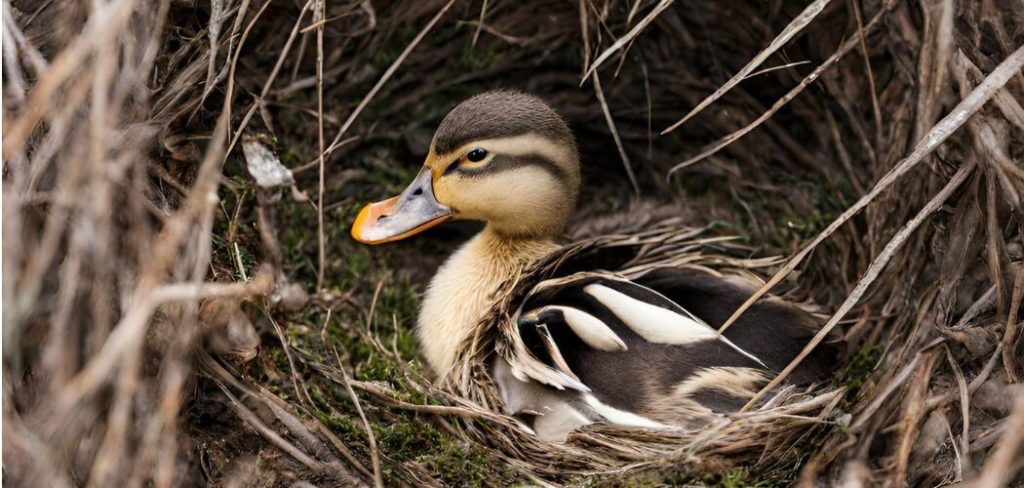Do ducks make nests? This is a question that many people have wondered about.
In this article, we will talk about the way ducks make their nests and the materials they use.

Do ducks make nests?
Ducks are known for their love of water, but do they make nests? The answer is yes! Ducks do make nests, but not all species of ducks build nests in the same way.
Female ducks are responsible for building nests, and they typically do so on the ground. They use materials such as grass, leaves, and twigs to create a shallow depression in the ground.
Some species of ducks, such as the wood duck, will also use tree cavities or nest boxes to lay their eggs.
Once the nest is built, the female duck will lay her eggs and incubate them until they hatch. During this time, she will line the nest with down feathers to keep the eggs warm and protected.
It’s important to note that not all ducks build nests. Some species, such as the merganser, will lay their eggs in the nests of other birds. This behavior is known as brood parasitism.
While not all species of ducks build nests, many do. Female ducks are responsible for building the nests, and they typically do so on the ground using materials such as grass and leaves.
Once the nest is built, the female will lay her eggs and incubate them until they hatch.
Where do ducks make their nest?
Ducks are known to make their nests in a variety of places, depending on the species and the availability of suitable nesting sites.
Here are some common places where ducks make their nests:
Ground nests:
Many species of ducks, such as mallards, make their nests on the ground, often in a well-concealed location.
The nests are usually made of plant materials such as grasses, leaves, and twigs, and lined with down feathers.
Nest boxes:
Some species of ducks, such as wood ducks, prefer to nest in cavities, such as those found in trees.
To provide suitable nesting sites for these ducks, nest boxes can be installed in suitable locations.
Natural cavities:
Some species of ducks, such as goldeneyes, prefer to nest in natural cavities, such as those found in trees or rock crevices.
Artificial structures:
In urban areas, ducks may make their nests in artificial structures such as planters, flower pots, or even on balconies.
While these nesting sites may not be ideal, they may be the only available option for ducks in urban environments.
It’s important to note that disturbing a duck’s nest can be harmful to both the eggs and the mother duck.
If you come across a duck’s nest, it’s best to keep your distance and let the mother duck do her job.
What materials do ducks make their nest with?
When it comes to building their nests, ducks are resourceful creatures that use a variety of materials found in their environment.
Here are some of the most common materials that ducks use to build their nests:
Grasses and reeds:
Ducks often use grasses and reeds to build their nests. They gather these materials from the surrounding vegetation to create a sturdy base for their nests.
Grasses and reeds are particularly useful for providing insulation and keeping the eggs warm.
Leaves and twigs:
Leaves and twigs are also commonly used by ducks to build their nests. They are often used to line the nest, providing a soft and comfortable place for the eggs to rest.
Twigs are also used to create a framework for the nest, helping to keep it stable and secure.
Feathers:
Ducks are known for their waterproof feathers, and they also use them to line their nests.
Feathers provide excellent insulation and help keep the eggs warm and dry.
They are also soft and comfortable, making them an ideal material for lining the nest.
Mud:
Mud is another material that ducks use to build their nests. They use it to create a solid base for the nest, which helps to keep it stable and secure.
Mud is also useful for filling in any gaps or holes in the nest, providing additional insulation and protection for the eggs.
Overall, ducks are skilled at using the materials available in their environment to build sturdy and comfortable nests for their eggs.
By using a combination of grasses, twigs, leaves, feathers, and mud, they create a safe and secure environment for their offspring to grow and thrive.
Do all species of ducks make their nest?
Not all species of ducks make their nest. Some species of ducks prefer to use the abandoned nests of other birds or use natural cavities in trees as their nesting sites.
Other species of ducks prefer to nest on the ground, while some species choose to nest in burrows.
For example, the Wood Duck is known for nesting in tree cavities, while the Ruddy Duck prefers to nest on the ground near water.
The Eider duck, on the other hand, nests in burrows in the ground.
It is important to note that some species of ducks may also use different nesting sites depending on the availability of suitable nesting sites in their habitat.
For instance, if a species of duck cannot find a suitable tree cavity or burrow, it may resort to building its nest on the ground.
Do ducks use a nesting box?
If you are considering providing a nesting box for your ducks, you may be wondering if they will use it. The answer is yes, ducks do use nesting boxes.
Nesting boxes provide a safe and secure place for ducks to lay their eggs. They also help to protect the eggs from predators and the elements. Ducks prefer nesting boxes that are dark, quiet, and dry.
When choosing a nesting box for your ducks, it is important to consider the size. The box should be large enough for the duck to comfortably sit in and turn around.
A good rule of thumb is to provide at least one square foot of floor space per duck.
It is also important to keep the nesting box clean and dry. Ducks are messy and can quickly turn a dirty nesting box into a breeding ground for bacteria and disease.
Provide clean, dry bedding such as straw or wood shavings and replace it regularly.
Nesting boxes are a great option for ducks and can help to ensure the safety and well-being of both the ducks and their eggs.
With the right size and proper maintenance, your ducks will happily use their nesting box.
What to do if a duck nests in your yard?
If you have a duck nesting in your yard, it’s important to take some precautions to ensure the safety of the duck and her eggs.
Here are some steps you can take:
Keep your distance:
It’s important to give the nesting duck some space. Try to avoid disturbing her and keep any pets or children away from the area.
This will help reduce stress on the duck and increase the chances of a successful hatch.
Provide food and water:
A nesting duck will need access to food and water, so consider providing a shallow dish of water and some birdseed or cracked corn nearby.
This will help ensure that the duck has the resources she needs to care for her eggs.
Protect the nest:
If the nesting duck has chosen an area that could be dangerous (such as a busy walkway or road), consider placing a small barrier around the nest to protect it.
You can use materials such as chicken wire or stakes and netting to create a safe zone for the duck and her eggs.
Wait it out:
Once the duck has started nesting, it’s important to let her finish the process without interference. This can take several weeks, so be patient and avoid disturbing the nest during this time.
By taking these steps, you can help ensure the safety and well-being of a nesting duck in your yard.
Remember to always respect wildlife and their habitats, and seek the advice of a wildlife expert if you have any concerns or questions.
Do ducks share nests?
Ducks are known to make nests to lay their eggs, but do they share their nests with other ducks? The answer is yes, ducks do share nests.
Female ducks, also known as hens, often share nests with other hens during the breeding season.
This behavior is known as “nesting in common” and is common among many duck species. By sharing nests, the hens can conserve energy and reduce the risk of predation.
When hens share a nest, they take turns incubating the eggs and leave the nest to forage for food or water.
This allows them to take care of their own needs while still ensuring that their eggs are safe and warm.
It’s important to note that not all ducks share nests. Some duck species, such as the wood duck, are solitary nesters and prefer to build their own nests.
Additionally, male ducks, also known as drakes, do not participate in nesting and do not share nests with hens.
Do ducks sleep in nests?
Ducks do not sleep in nests. Instead, they sleep on the ground, usually near water sources where they can easily access food and water.
While ducks do use nests for laying eggs and incubating them, they do not sleep in them.
Nests are typically used by female ducks for laying eggs, and they are constructed with materials such as grass, leaves, and feathers.
Ducks may also use nests as shelter from rain or wind. However, they typically do not spend extended periods in them, preferring instead to sleep on the ground.
It is important to note that different species of ducks may have different nesting and sleeping habits. However, in general, ducks do not sleep in nests.
Final Thoughts:
Ducks are capable of making nests, but not all species do so. The type of nest and its location varies depending on the species and the environment they live in.
Some ducks prefer to nest on the ground, while others build their nests in trees or on water. It’s important to note that not all ducks are skilled at nest-building.
Some species, such as the mallard, are known for their ability to construct elaborate nests, while others may make simple depressions in the ground or use pre-existing structures.
